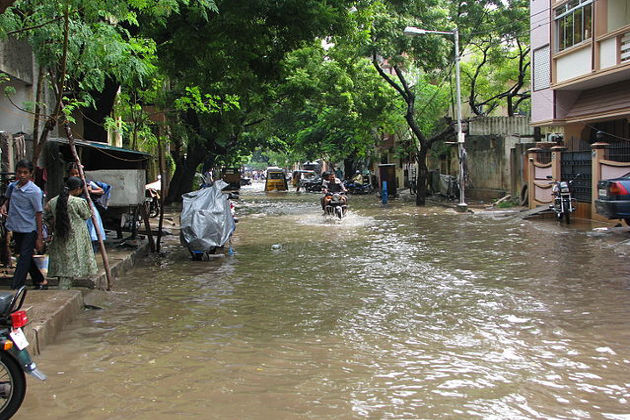Severe floods and landslides ravage Himalayan states in India
Mohan Sinha
09 Sep 2025, 09:53 GMT+10

- At least 90 people have lost their lives and hundreds more have been displaced as unrelenting monsoon rains continue to batter northern India, unleashing some of the most severe flooding and landslides the region has seen in decades
- The toll is mounting as communities grapple with rising rivers, collapsed homes, and disrupted livelihoods
- India’s Himalayan states and territories—including Uttarakhand, Himachal Pradesh, Jammu and Kashmir, and the populous agricultural hub of Punjab—have been among the hardest hit
NEW DELHI, India: At least 90 people have lost their lives and hundreds more have been displaced as unrelenting monsoon rains continue to batter northern India, unleashing some of the most severe flooding and landslides the region has seen in decades, according to government officials.
The toll is mounting as communities grapple with rising rivers, collapsed homes, and disrupted livelihoods. Experts warn that climate change is fueling the worsening pattern of extreme rainfall events.
India's Himalayan states and territories—including Uttarakhand, Himachal Pradesh, Jammu and Kashmir, and the populous agricultural hub of Punjab—have been among the hardest hit. In New Delhi, where the Yamuna River has swollen far above its danger mark, thousands of residents have been evacuated to higher ground.
Authorities report that water levels have already surpassed annual averages, submerging major roadways and paralyzing transport links. Earlier this week, floodwaters washed over the New Delhi–Gurugram highway, causing an eight-hour traffic jam.
Punjab, home to more than 30 million people, has experienced extensive destruction. At least 30 deaths and over 300,000 affected residents have been reported in the state alone. Farmers say fields of rice, wheat, and maize have been destroyed, along with livestock, threatening food security in one of India's key agricultural regions.
Surinder Singh, a farmer in Kapurthala district, said his 10-acre farm has been underwater since August 11. "We have lost crops worth over 700,000 rupees. Our children have been moved to safer villages, but we have received very little support from the government," he explained.
Similar stories of devastation echo across the Himalayas. Landslides in Uttarakhand swept away villages, killing at least four people and leaving dozens missing. In July, overflowing glacial lakes destroyed hydropower projects and wiped out a critical bridge linking Nepal to China. In Kashmir, farmers say their lands have been repeatedly inundated this year.
Fayaz Ahmad, a 70-year-old grower near Srinagar, described a sense of helplessness: "We endured extreme heat earlier, and now our fields are under water after just a few days of rain. It was never like this when I was young."
Scientists point to human-driven climate change as a key factor behind these erratic and destructive monsoon patterns. Traditionally stretching from June to September, the rains once followed a relatively predictable cycle. Now they arrive in violent bursts that dump massive amounts of water within hours or days, followed by prolonged dry spells. "We are living in a world nearly 1.5 degrees hotter than pre-industrial times," said Anjal Prakash, a climate expert and author of several UN reports. "The intensity and frequency of such extreme rainfall events will only rise. This is the new normal."
Experts warn that rapid urbanization, deforestation, and poorly managed infrastructure have worsened flooding across South Asia by destroying natural drainage systems and mismanaging rivers. Akshay Deoras, a UK-based meteorologist, noted: "If rainfall were evenly spread, the impact would be limited. But when a month's rain falls within a few days, disaster is unavoidable—and that's exactly what we're witnessing."
Climate experts emphasize that governments must invest in smarter planning and resilient infrastructure, including early warning systems, better flood management, and, in some cases, relocation of vulnerable communities. Without such measures, they caution, the cycle of devastation will only intensify as climate extremes become a defining feature of South Asia's future.
"Right now, in India, there is no clear vision as to how things could be handled in the future," he said.
 Share
Share
 Tweet
Tweet
 Share
Share
 Flip
Flip
 Email
Email
Watch latest videos
Subscribe and Follow
Get a daily dose of Milwaukee Sun news through our daily email, its complimentary and keeps you fully up to date with world and business news as well.
News RELEASES
Publish news of your business, community or sports group, personnel appointments, major event and more by submitting a news release to Milwaukee Sun.
More InformationInternational
SectionSevere floods and landslides ravage Himalayan states in India
NEW DELHI, India: At least 90 people have lost their lives and hundreds more have been displaced as unrelenting monsoon rains continue...
Bullfighting and cockfighting to be banned in Colombia by 2028
BOGOTA, Colombia: Colombia's Constitutional Court on September 4 upheld a 2024 law banning bullfights across the country, while going...
Trump admin vows strict enforcement of foreign worker rules
WASHINGTON, D.C.: The White House defended a major raid at a Hyundai facility in Georgia, saying it underscored the Trump administration's...
Discover of K2-18b spurs a new hope for alien life
A wave of excitement and rigorous skepticism continues to sweep through the astronomical community following a series of groundbreaking...
Viral ‘Nicolas foots the bill’ fuels France’s generational rift
PARIS, France: French millennials are venting their frustration at baby boomers, blaming the older generation for leaving them with...
After Armani: heirs, aides, and a foundation shape the empire’s fate
MILAN, Italy: Giorgio Armani's death at 91 has left one of fashion's most enduring empires facing a future without the man who controlled...
Wisconsin
SectionMedical groups say Kennedy endangers Americans, call for resignation
WASHINGTON, D.C.: U.S. Health Secretary Robert F. Kennedy Jr. is facing intensifying pressure to resign after more than 20 leading...
MLB roundup: Phillies drop Mets, gain another game in East
(Photo credit: Eric Hartline-Imagn Images) Aaron Nola pitched six scoreless innings and Jhoan Duran escaped a tense situation in...
Michael Helman's grand slam carries Rangers past Brewers
(Photo credit: Tim Heitman-Imagn Images) Michael Helman drove home every Texas run with a grand slam and an RBI double to back the...
YouTube touts 16.2M viewers for Chiefs-Chargers game in Brazil
(Photo credit: Amanda Perobelli/Reuters via Imagn Images) YouTube reported a Nielsen-measured audience of 16.2 million viewers of...
Cardinals activate Alec Burleson after short IL stint
(Photo credit: Jeff Curry-Imagn Images) The St. Louis Cardinals activated first baseman/outfielder Alec Burleson from the 10-day...
Brewers activate RHP Grant Anderson (ankle) from IL
(Photo credit: Michael McLoone-Imagn Images) The Milwaukee Brewers activated right-hander Grant Anderson from the injured list Monday...












